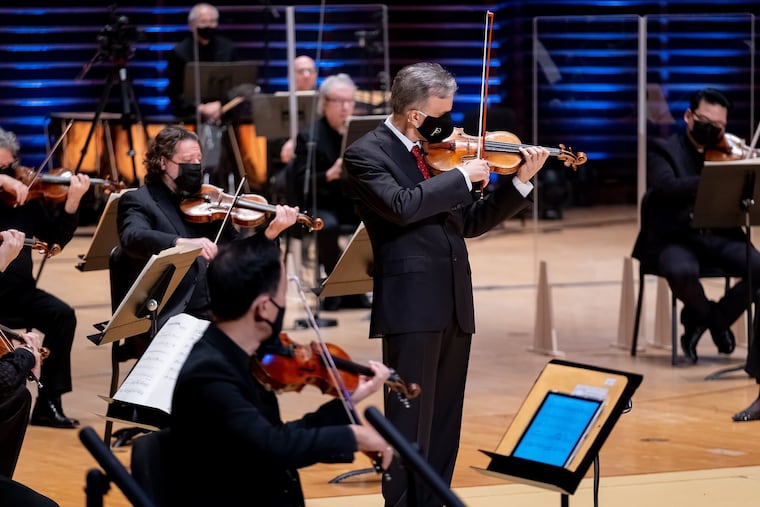The Philadelphia Orchestra’s Lunar New Year concert shows how streamed video can be better than the real thing
In the upcoming Digital Stage production, the video’s close proximity to the musicians draws attention to the music’s finer points.

Amid the shifting diplomatic relations between the U.S. and China, the Philadelphia Orchestra maintains cultural connections even when going there obviously isn’t possible. Its next Digital Stage concert, which will stream starting at 8 p.m. Thursday, celebrates the Lunar New Year — but not in ways that are second best to a live event. This time, video versions are better.
The two pieces on the program are a newly shot performance of the Butterfly Lovers Violin Concerto by He Zhanhao and Chen Gang and a 2017 performance of Tan Dun’s Nu Shu: The Secret Songs of Women, Symphony for Microfilms, Harp, and Orchestra.
Neither will be heavy lifting to listeners who haven’t previously heard these works. In fact, Butterfly Lovers falls so easily on the ear that one is inclined in a standard live performance to hear only the piece’s antecedents, whether they’re Tchaikovskian cadenzas or big movie-music moments. But here the video’s close proximity to the musicians draws attention to the music’s finer points.
Written in 1959 when the coauthors were still conservatory students in Shanghai, Butterfly Lovers was going for an East-West fusion that seems blissfully unaware of the modernism happening in the rest of the world at that time.
When the piece started getting more performances after China’s Cultural Revolution of the 1960s and ’70s, it easily felt naive and retro. It still does, but this performance makes those qualities charming and seductive with all manner of lyrical solos and duets in the piece’s narrative about star-crossed lovers.
Pentatonic scales and sliding pitches suggest Chinese folk music, while precise scoring reflects the delicate coloring of traditional Chinese art. The opportunity to watch how it’s done is a considerable listening aid.
Guest conductor David Robertson always knows how to give a piece exactly what it needs, and violinist Gil Shaham’s conviction is palpable. He truly seems to connect with the piece, with strong interpretive ideas clothed in his glistening, focused, middle-weight tone.
Shaham seems to be in peak form these days, not just here but in fresh, swift recordings of Beethoven and Brahms concertos (with the Knights chamber orchestra on Canary Classics) and, greatest of all, the Berg Violin Concerto, majestically recorded with the San Francisco Symphony under Michael Tilson Thomas (SFS Media).
Tan’s Nu Shu was a big presence on the Philadelphia Orchestra’s 2014 tour of China, but even in the best performances — such as this one heard/seen in April 2017 at the Kimmel Center under Yannick Nézet-Séguin — you had to use your imagination as to how Tan’s films of Chinese peasant women and the live Philadelphia Orchestra fit together. Video projections weren’t great. Balancing the video sound with the orchestra’s was intermittently convincing. Those problems are 100% solved, as the two entities are melded on video.
In the tradition of the great composer/ethnomusicologist Béla Bartók, composer Tan was rescuing a centuries-old secret language from a sorority-like society of women in a village outside of his hometown of Changsha.
Besides showing women, young and old, singing with each other, the films feature percussion effects achieved through stones hitting each other and water rhythmically splashed. Much of this is mirrored in the orchestral writing, though the primary voice is that of the solo harp, with imaginative effects played by the orchestra’s principal, Elizabeth Hainen (who is one of the best there is).
So often when making grand sociological statements, composer Tan doesn’t write his best music, and that’s the case here. But the music is engaging enough that I suggest listeners make two passes through the piece, the second with the video turned off.
The Chinese singers express themselves in rhythmic and melodic irregularities that can’t be seamlessly framed by the precision-oriented orchestra, and the friction between the two is more apparent — and interesting — when heard after first being seen.
The Philadelphia Orchestra’s Lunar New Year Concert is available for streaming 8 p.m. Thursday through 11 p.m. Feb. 14. Tickets start at $15. Information: philorch.org.